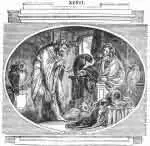A Philosopher spent all on a talkative Parrot so that the Parrot could teach him things he had never heard from others.
Having a free tongue may be more of a hindrance than help.

Northcote
An honest plain-dealing sage, but whose mind was stored with true philosophy, was one day walking in the street, when he saw a beautiful Parrot in a shop where birds were sold; and being much taken by her prating, enquired the price: and they answered, one hundred and fifty crowns. The poor philosopher, to his great mortification, found his pockets would not afford such a sum; however, says he, because I fancy the bird, I don’t care if I truck with you for it; that is, I’ll give you my bed, chairs, and all the other moveables of my lodgings at your own price for it. The shop-keeper agreed, and the bargain was concluded, but yet was much surprised, and could not refrain from pitying and asking the philosopher if he had lost his senses, that he who wanted clothes to his back, should be so extravagant as to chaffer the furniture of his house, nay, even his bed from under him, the sole repose of his wearied body and over-laboured mind, and all to purchase a tawdry Parrot? “Ah!” replied the Philosopher, “to me it will prove an inestimable treasure, and I would have reduced myself to nakedness, rather than have gone without her, for my misfortune is to have a free tongue, and a plain and open heart;—great virtues these in former ages; now, unpardonable faults, as I have found to my cost: but I hope to put an end to all this, by keeping this wonderful bird, who will “teach me what I know nothing of, though so much in fashion: that is, the art of concealing the true thoughts of our own soul, and tickling people’s ears with words only from the tongue, and speeches learned by rote.”
Application
It is but a melancholy reflection, when we consider, that by a purity and freedom of speech, such as proceeds from an open honest heart, a man may do himself more injury in his worldly interest, than by the most deceitful hypocrisy and fawning flattery; and that to make your fortune in this world, you must stifle the real thoughts of your heart, and give instead of them, deceit, flattery, and falsehood; for, unfortunately, the pleasure of adulation, however false, goes so far, that the greatest of our enemies makes himself agreeable, when he imposes upon us with it; and the best of our friends seldom undeceives us, but we are offended at it, for few men are so wise as to prefer useful reproofs to treacherous praise. But flattery will never be out of credit, so long as there are knaves to give it, and fools to take it. There is nothing, says Juvenal, that a man will not believe in his own favour.
Italian.

